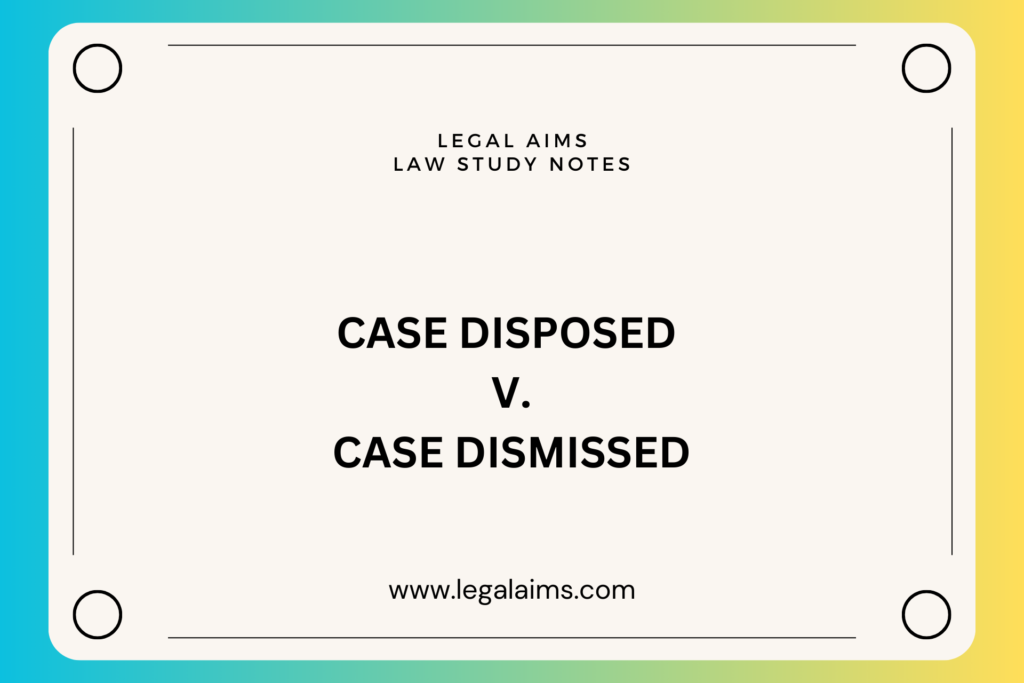Disposed of Meaning in Court Explained | Disposed vs Disposed Of | Dismissed

Case disposed v case dismissed
Introduction
If you’ve ever checked your court case status and noticed the term “case disposed” or “case disposed of”, you might wonder what it really means. This guide explains the legal meanings of “disposed” and “disposed of,” their significance in court proceedings, and clears common misconceptions—tailored for readers seeking legal clarity and top search engine performance in 2025.
What Does “Disposed” or “Disposed of” Mean in Court?
Disposed and disposed of in a legal context both signify that a court case has been completely resolved and concluded. These terms indicate that all matters related to the case have been settled, a final judgment or order has been passed, and no further hearings or action are pending on that case. This usage applies to civil cases, criminal matters, property disputes, divorce petitions, and many more court matters.
Note:
“Disposed of” is the grammatically correct formal English usage, while “disposed” is the standard legal term used in court documentation. Both clearly communicate that the case is settled. Some Indian court documents, due to translation and local usage, also use the phrase “disposed off,” but the correct form is “disposed of.”
Key Points
- Disposed/Disposed of ≠ Dismissed:
Disposed or disposed of means concluded—either through a verdict, agreement, plea, or another manner. - Disposed of and disposed both reflect the final status of a case, determining the legal consequences for all involved parties.
- Applicable to both contested and uncontested cases.
- “Disposed off” is a colloquial, less formal term mainly found in Indian legal documents but should be avoided for grammatical correctness.
How Is a Case Disposed of in Court?
A court disposes or disposes of a case through several paths, including:
- Judgment/Order: After hearing all arguments and evidence, the judge delivers a final verdict or order.
- Settlement or Compromise: Parties may reach an agreement, and the court records this as disposal.
- Dismissal: If a case lacks sufficient evidence or has technical flaws, it can be dismissed—a type of disposal.
- Plea Bargain: In criminal cases, a plea agreement may result in disposal.
- Uncontested Judgment: When no party contests the allegations, the court issues a final ruling.

Disposed vs. Disposed Of vs. Dismissed: Understanding the Differences
| Term | Correct Legal Usage | Meaning | Example Situations |
|---|---|---|---|
| Disposed | Yes, standard term | Case concluded/finalized | Verdict given, settlement reached |
| Disposed of | Yes, grammatically correct and formal | Case concluded/finalized | Judgment issued, matter settled |
| Dismissed | Yes | Case stopped for technical/procedural reasons | Insufficient evidence, error |
- Disposed and disposed of include verdicts of both guilt and innocence, settlements, and uncontested decisions.
- Dismissed means the matter is ended on technical or procedural grounds, without a decision on the actual facts.
Implications of Case Disposed/Disposed of
- Legal Consequences: Determines if parties owe compensation, face penalties, or are acquitted.
- Finality: Generally, cases marked as disposed/disposed of cannot be reopened, unless significant new evidence emerges or there is a major procedural error.
- Reopening Possibility: Rare, but possible if new facts surface or a legal error is established.
Timeframe for Disposal in Indian Courts
The Civil Procedure Code (CPC) and Code of Criminal Procedure (CrPC) prescribe certain timelines for cases to be disposed of quickly. Failure to resolve cases within these timeframes can lead to procedural consequences, including stays or dismissals.
Disposed/Disposed of Case Status Explained
- Complete Disposal/Disposed of: All legal issues are resolved—no further hearings are pending.
- Partial Disposal/Disposed of: Some issues remain, but most of the case is concluded.
- Court portals and online cause lists update the status from “pending” to “disposed” or “disposed of” once a final order or judgment is recorded.
Disposed/Disposed of Meaning in Court (Hindi)
मामले का निपटारा (Disposed/Disposed of) का मतलब है कि अदालत द्वारा किसी मामले का अंतिम निर्णय सुना दिया गया है और अब उसकी सुनवाई या कोई अन्य कार्रवाई शेष नहीं है.
Importance of Disposed/Disposed of Status
- Finalizes the dispute and clarifies the parties’ legal rights and responsibilities.
- Marks closure, enabling possible enforcement of the court’s decision such as recovery, release, or penalty.
Conclusion
Understanding what “disposed” and “disposed of” mean in the court context helps you track your legal matter’s status with confidence. Always check if your case was disposed/disposed of by judgment, dismissal, or settlement to know the real outcome. For any legal uncertainty, consult a qualified attorney.
Q1: Can disposed/disposed of cases be appealed?
Yes. Parties dissatisfied with the result may appeal to a higher court, provided the law allows.
Q2: Is a disposed/disposed of case the same as won or lost?
No. “Disposed/disposed of” only means the case is finalized. The verdict could favor any party.
Q3: Can a disposed/disposed of case be reopened?
Q3: Can a disposed/disposed of case be reopened?
Generally, no, unless substantial new evidence or legal error is proven.
Disclaimer
The information provided in this post has been verified to the best of our knowledge. Readers are encouraged to independently verify the details before taking further action.






